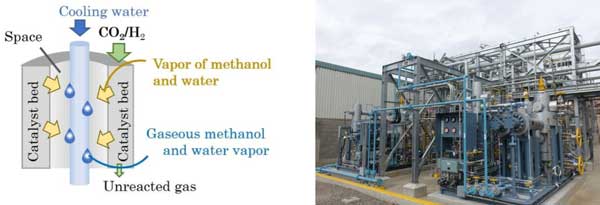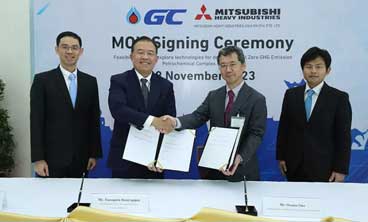Green news: Sumitomo Chemical starts up CO2-to-methanol demo plant in Japan; PTTGC/MHI to explore carbon neutral technology for petchem plant in Thailand
Japanese firm Sumitomo Chemical says it has completed the construction of a pilot facility to establish a process for producing methanol from CO2 at its Ehime Works, located in Niihama City, Ehime Prefecture, Japan, and has commenced operations at the facility. The company aims to complete the demonstration of this technology by 2028, as well as start commercial production using the new process and license the technology to other companies in the 2030s.

Carbon capture and utilisation (CCU) technology is expected to serve as a game-changing solution to halt global warming and achieve a circular economy for carbon by recovering CO2 and utilising it in products, and Sumitomo Chemical is accelerating the development and spread of various new CCU processes.
Among them is a technology that uses CO2 to produce methanol, a raw material for a wide range of products, from plastics to adhesives, chemical agents, and paints. It is often cited as a key example of CCU technology. However, conventional CO2-to-methanol conversion processes have faced challenges, such as low yield due to the reversible nature of the reaction and catalyst degradation caused by byproduct water.
Sumitomo Chemical has resolved these issues through joint development with Professor Koji Omata of Shimane University Interdisciplinary Faculty of Science and Engineering, leveraging the internal condensation reactor (ICR), a technology that Professor Omata has been developing.
The ICR enables the condensation and separation of methanol and water within the reactor, which is impossible with conventional technologies. This helps to improve yield, downsize equipment, and achieve higher energy efficiency, while it is also expected to prevent catalyst degradation.
Sumitomo Chemical says it is also working on six development themes that include four chemical recycling technology projects, a project for the development of a CO2 separation and capturing system using CO2 separation membranes, and a project for the development of a battery cathode materials recycling process.

In other news, Thailand’s petchem firm PTT Global Chemical Public Company Limited (GC) signed a Memorandum of Understanding (MOU) with Mitsubishi Heavy Industries Asia Pacific (MHI-AP) to jointly study the technologies required to develop a large-scale petrochemical complex that aims to support Thailand's Carbon Neutrality plan by 2050.
This collaboration between GC and MHI-AP will involve the study of solutions that use low carbon fuels such as hydrogen and ammonia, as well as Carbon Capture and Storage technologies.
The MOU covers a total duration of four years and includes two main objectives to assess the feasibility of applying decarbonisation technologies to GC's assets.
The first is to conduct research to compare the feasibility of using hydrogen and ammonia as fuels for gas turbines, as well as CCS technologies to reduce carbon dioxide emissions from power generators.
The second objective is to assess how CCS technologies can best be applied and optimised for the steam-methane reforming (SMR) process. MHI-AP will support this through providing carbon capture technologies as well as hydrogen combustion gas turbines and ammonia gas turbines.
This collaboration is aligned with Thailand's announcement to achieve carbon neutrality by 2050 and with GC's operational strategies for robust and sustainable business growth alongside partners under the concept "Together to Net Zero", which aims to reduce greenhouse gas emissions by 20% by 2030 and achieve net zero greenhouse gas emissions by 2050.
Toasaporn Boonyapipat, Chief Operating Officer of GC's Base and Intermediate Chemicals Business, stated that one of the initiatives of the firm is to reduce greenhouse gas emissions by researching ways to improve and develop processes by integrating modern technologies. “For instance, hydrogen/ammonia can be incorporated as fuel in power generation instead of natural gas to achieve net-zero greenhouse gas emissions,” he added.
This collaboration between GC and MHI-AP is a pivotal part of a broader initiative involving numerous prominent global firms to foster an environmentally friendly industry, the statement added.
(PRA)
Subscribe to Get the Latest Updates from PRA Please click here
©2023 Plastics and Rubber Asia. All rights reserved.

©2023 Plastics and Rubber Asia. All rights reserved.
Home Terms & Conditions Privacy Policy Webmail Site Map About Us
















